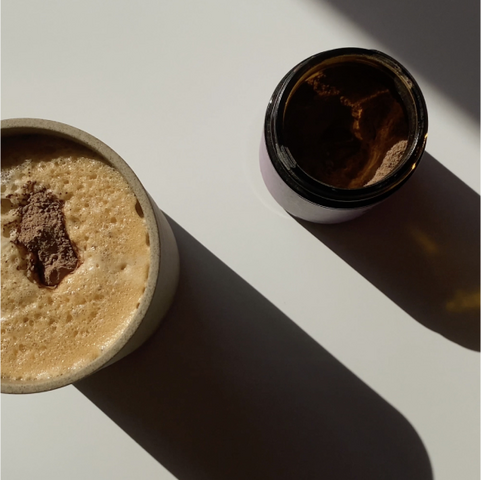Magnesium is an essential mineral that plays a role in hundreds of bodily processes — muscle contractions, heart function, and energy production. Addressing a Magnesium deficiency may boost your energy levels and improve your sleep quality.
Magnesium supplementation also helps promote relaxation and gut motility, but what about Magnesium for bloating? Can this abundant earth mineral help calm the gut and prevent uncomfortable gas build-up?
Below, we dig deeper into whether a Magnesium supplement can help prevent you from getting blocked up and banish bloat.
Does Magnesium Help With Bloating?
If you're wondering whether Magnesium can help relieve bloating, the answer is often yes, depending on the cause. Bloating can happen for a variety of reasons, including:
- Eating too quickly
- Not chewing food well
- Food intolerances
- Excess gas
- Constipation
- Imbalances in stomach acid
Magnesium can be particularly helpful for bloating related to constipation. It works as a natural muscle relaxant, helping to ease the digestive tract and promote regular bowel movements. Certain types of Magnesium, like Magnesium Citrate, are known for their gentle laxative effect, which can relieve bloating caused by digestive sluggishness. Additionally, Magnesium helps regulate muscle contractions and may reduce spasms in the digestive tract, which can ease discomfort from gas and bloating.
If your bloating is due to other factors, like food intolerances or acid imbalances, Magnesium may not fully address the issue, but it can still support overall digestive health and help your system function more smoothly.
The Role of Magnesium in Digestion
Some studies show that taking a Magnesium supplement can help reduce bloating in people with recurring digestive issues.
Magnesium plays an important role in digestion and GI tract motility. The mineral helps regulate stomach acid production, which is important for healthy digestion.
Not having adequate Magnesium levels can impact stomach acid levels and make it harder for your body to digest food properly, leaving food to ferment and release excess gas that leads to bloating.
Slowed digestion can also trigger bouts of constipation, another cause of a bloated stomach. Magnesium promotes gut motility and prevents constipation-related bloating by softening and making stool easier to pass. That’s why Magnesium is such a great supplement to take daily if you need more regular bowel movements.
Magnesium's Effect on Muscle Relaxation
When you ingest food, your digestive system moves it along your gastrointestinal (GI) tract. During this process, your intestines contract and relax to keep digested substances moving—this is known as gut motility.
Magnesium is important for muscle relaxation and contraction. Without adequate Magnesium, your muscles (including those within your GI tract) won’t function properly. Slowed digestion can contribute to excess gas production and more abdominal bloating. Low Magnesium can even show up as muscle spasms that make bloating worse. A deficiency can also lead to constipation, leaving you feeling blocked up and bloated.
According to one study involving 34 female participants with chronic constipation, a 3x daily dose of Magnesium Oxide for 28 days helped those with mild to moderate symptoms.
Keep in mind that while Magnesium can help promote healthy digestion, too much of it can have the opposite effect, triggering abdominal cramping, diarrhea, and other digestive symptoms. When adding a natural Magnesium supplement to your routine, make sure to start with the lowest dose to see how your GI system responds.
Magnesium and Water Retention
Dietary Magnesium is an electrolyte that regulates electrolyte levels and is crucial for maintaining fluid balance in the body. The right balance of electrolytes, including sodium and potassium, helps prevent fluid retention that can trigger swelling and bloating. The mineral is also important for supporting kidney function, ensuring the kidneys can properly flush out excessO.
Magnesium is also a known anti-inflammatory. Since inflammation can trigger the body to retain water, addressing a Magnesium deficiency may help limit bloating due to water retention.
Your hormones can also impact your body’s fluid balance. Evidence shows that Magnesium supplements can regulate stress levels by influencing the nervous system and preventing hormone imbalances that can throw your fluid levels out of whack.
The less you retain water, the less bloated you’ll feel.
Magnesium for Stress Relief
Did you know that stress can impact your digestion? That’s thanks to the mind-gut connection. Your brain and gut regularly communicate, sending signals to one another. If you’re feeling stressed, you’ll likely feel it in your gut. Your digestive system may respond to stress with cramping, leading to excess gas and bloating.
Evidence suggests that supplementing with Magnesium may help with anxiety and stress relief.
How to Take Magnesium for Bloating Relief
Wondering how to take Magnesium for relief from bloating? Here’s some guidance to get you started.
Best Magnesium for Bloating
If you’re considering using Magnesium supplements as a natural remedy for bloating, you should know that there are several different types of Magnesium available.
Here are the best options for banishing bloat:
- Magnesium Citrate. This highly bioavailable form of Magnesium can help manage constipation and improve regularity. It’s the best option for addressing bloating due to constipation.
- Magnesium Glycinate. Another easy-to-absorb dietary supplement that’s unlikely to trigger digestive upset. It helps promote relaxation, which can aid in limiting bloating.
- Magnesium Oxide. A powerful, natural laxative that can loosen stools and reverse constipation.
Timing and Absorption
When taking a Magnesium supplement for the first time, it’s a good idea to start with the lowest dose and work your way up to see how your body reacts—especially if you’re trying to relieve bloating. In some people, overdoing it on the Magnesium supplementation can cause diarrhea.
Additionally, if you have chronic bloating and can’t seem to find relief no matter what you try, consider speaking with a healthcare professional.
You can make it easier for your body to absorb Magnesium by making sure you stay hydrated. Proper hydration can also help reduce bloating and make you less likely to experience constipation.
Say Goodbye to Bloating With Magnesi-Om
Magnesi-Om® is a natural Magnesium powder supplement containing 3 bioavailable forms of Magnesium + L-Theanine to help promote healthy fluid balance, gut motility, and relaxation. The Magnesium powder is available in several flavors, including blue lemon and berry.

Takeaway: Magnesium and Bloating
Research suggests Magnesium is an effective option for relieving temporary bloating due to digestive concerns.
Other ways to alleviate bloating in tandem with Magnesium supplementation include:
- Limiting your salt intake to prevent water retention
- Eating smaller, more frequent meals to encourage healthy digestion
- Limiting intake of carbonated drinks to prevent excess gas
- Boosting your fiber intake (while making sure you drink plenty of water!)
- Exercising regularly to keep your digestive system in motion
- Using mindfulness techniques to limit stress and improve gut health
Taking a natural Magnesium supplement, paired with healthy habits, can be an effective way to curb bloating and provide relief from digestive issues.
If your bloating persists or gets worse, speak with a healthcare professional to determine the underlying cause.
Sources
- PubMed Central.Management Strategies for Abdominal Bloating and Distension. https://www.ncbi.nlm.nih.gov/pmc/articles/PMC4991532/
- PubMed Central.A Randomized Double-blind Placebo-controlled Trial on the Effect of Magnesium Oxide in Patients With Chronic Constipation. https://www.ncbi.nlm.nih.gov/pmc/articles/PMC6786451/
- Amarican Family Physician.Gas, Bloating, and Belching: Approach to Evaluation and Management. https://www.aafp.org/pubs/afp/issues/2019/0301/p301.html
- Johns Hopkins.Bloating: Causes and Prevention Tips. https://www.hopkinsmedicine.org/health/wellness-and-prevention/bloating-causes-and-prevention-tips
- Mount Sinai.Magnesium. https://www.mountsinai.org/health-library/supplement/magnesium
- PubMed Central.Management Strategies for Abdominal Bloating and Distension. https://www.ncbi.nlm.nih.gov/pmc/articles/PMC4991532/
- PubMed.Salt and Water Retention Is Associated with Microinflammation and Endothelial Injury in Chronic Kidney Disease. https://pubmed.ncbi.nlm.nih.gov/31514183/
- PubMed Central.Mindful Eating: A Review Of How The Stress-Digestion-Mindfulness Triad May Modulate And Improve Gastrointestinal And Digestive Function. https://www.ncbi.nlm.nih.gov/pmc/articles/PMC7219460/
- PubMed Central.A Randomized Double-blind Placebo-controlled Trial on the Effect of Magnesium Oxide in Patients With Chronic Constipation. https://www.ncbi.nlm.nih.gov/pmc/articles/PMC6786451/














